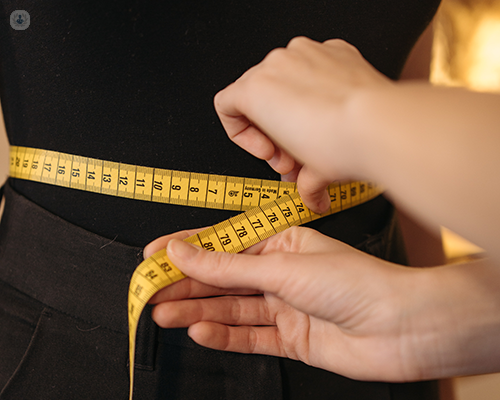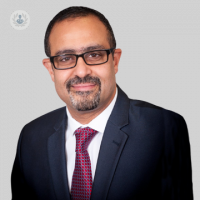Liposuction: Your all-you-need-to-know guide
Written by:Liposuction is a popular surgical procedure that can sculpt and define one’s body shape to achieve a more aesthetically pleasing figure.
Here to provide an expert insight into liposuction is Mr Haitham Khashaba, renowned consultant plastic surgeon.

What is involved in the liposuction procedure? Does it hurt?
Liposuction is a surgical procedure used to remove excess fat from targeted areas of the body. The procedure is typically performed using a small, hollow tube (called a cannula) that is inserted through tiny incisions in the skin.
Before the procedure, the patient will be given anaesthesia to ensure their comfort throughout the surgery. Depending on the extent of the procedure, the anaesthesia may be local or general.
During the procedure, I will make small incisions in the targeted area(s) of the body and insert the cannula to suction out excess fat. The cannula is moved back and forth through the fat layer to break up the fat cells and remove them from the body. This process may take anywhere from one to several hours, depending on the size and number of areas being treated.
After the procedure is complete, the incisions will be closed and a compression garment will be placed over the treated area(s) to aid in healing and reduce swelling.
As for pain, most patients report feeling some discomfort and soreness after the procedure, but this can typically be managed with pain medication and proper aftercare. It is important to follow all post-operative instructions carefully to ensure proper healing and minimise any discomfort.
It is also worth noting that while liposuction can be an effective way to remove stubborn fat deposits, it is not a substitute for a healthy diet and exercise. Patients should continue to maintain a healthy lifestyle in order to maintain their results long-term.
Do liposuction results last?
As a plastic surgeon, I should clarify that liposuction results can vary from patient to patient and are influenced by several factors, such as genetics, lifestyle habits and ageing. However, in general, the results of liposuction can be long-lasting if the patient maintains a healthy lifestyle and does not gain significant weight after the procedure.
Liposuction permanently removes fat cells from the treated areas, so the results can be seen immediately after the procedure. However, it is important to note that liposuction does not prevent new fat cells from forming in the treated areas or in other areas of the body. Therefore, it is possible to regain weight and accumulate new fat in the treated areas or elsewhere in the body if the patient does not maintain a healthy diet and does not exercise regularly.
To maintain the results of liposuction, patients are advised to continue following a healthy lifestyle, which includes eating a balanced diet, staying hydrated and engaging in regular physical activity. By doing so, patients can optimise their liposuction results and enjoy a slimmer, more sculpted physique for many years to come.
How much weight do you lose with liposuction?
As a plastic surgeon, I must also emphasise that liposuction is not a weight loss procedure, but rather a body contouring procedure designed to remove stubborn fat deposits that are resistant to diet and exercise. While it is possible for patients to lose some weight as a result of liposuction, the amount of weight loss is typically minimal and should not be the primary goal of the procedure.
The amount of fat that can be safely removed during liposuction is limited, and the ideal candidate for the procedure is someone who is close to their ideal body weight but who has specific areas of excess fat that they would like to address. The amount of fat that can be removed during liposuction depends on several factors, including the patient's body type, the areas being treated, and the amount of fat present in those areas.
Liposuction is not a substitute for weight loss, and patients who are significantly overweight are typically not good candidates for the procedure. Instead, weight loss should be achieved through a combination of diet and exercise before considering liposuction as a body contouring option.
Overall, the goal of liposuction is not to lose weight, but to sculpt and contour the body to achieve a more aesthetically pleasing appearance.
What are the disadvantages of liposuction? Does it leave loose skin?
While liposuction is a generally safe and effective procedure, there are some potential disadvantages and risks associated with the procedure. One of the most common concerns among patients considering liposuction is the potential for loose or sagging skin after the procedure.
Liposuction removes fat cells from the treated area, but it does not address excess skin or tissue that may be left behind. In cases where there is a significant amount of excess skin, such as after significant weight loss or in older patients with less elastic skin, liposuction alone may not be sufficient to achieve the desired results. In such cases, additional procedures such as a tummy tuck or body lift may be necessary to remove excess skin and create a more contoured appearance.
Other potential disadvantages of liposuction include bruising, swelling and discomfort during the recovery period, as well as the risk of infection, bleeding or other complications. Patients should also be aware that the results of liposuction are not immediate and may take several weeks, or even months, to fully appear as swelling and bruising subside.
It is important for patients to have a realistic expectation of the results of liposuction, and to discuss any concerns or questions with their plastic surgeon prior to the procedure. A qualified plastic surgeon can assess the patient's individual needs and goals, and recommend the most appropriate treatment plan to achieve the desired results while minimising the risk of complications.
Mr Haitham Khashaba is a distinguished consultant plastic surgeon with over 20 years’ experience.
If you are considering liposuction and would like to discuss your options with an expert, do not hesitate to book an appointment with Mr Khashaba via his Top Doctors profile today.


